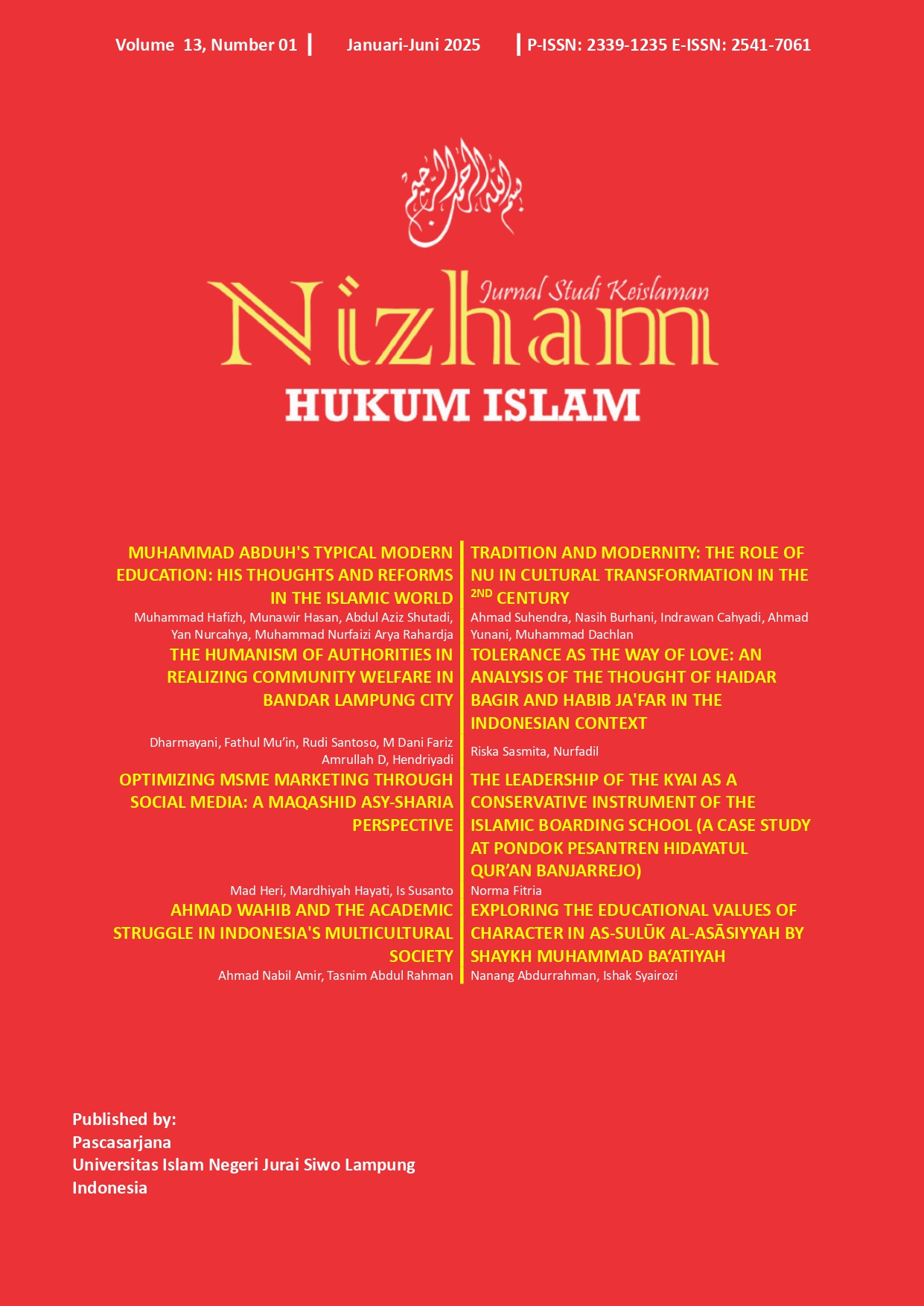Optimizing MSME Marketing through Social Media: A Maqashid asy-Sharia Perspective
DOI:
https://doi.org/10.32332/nizham.v13i02.10051Keywords:
Maqashid asy-sharia , marketing strategy, MSMEs, social mediaAbstract
This study aims to analyze the optimization of marketing strategies through social media for the development of Micro, Small, and Medium Enterprises (MSMEs) in Lampung Province from the perspective of Maqashid asy-sharia. Employing a qualitative descriptive method, data collection was conducted through interviews and observations with MSME owners and relevant stakeholders. The results of this study indicate that: (1) the utilization of social media as a marketing tool has proven to be highly effective in expanding the reach of MSMEs, enhancing brand awareness, and increasing consumer engagement; (2) marketing through social media aligns with the principles of Maqashid asy-sharia, particularly in preserving wealth (hifdz al-mal) and ensuring ethical business practices. Furthermore, this study provides a deeper understanding of how digital marketing strategies can be harmonized with Islamic ethical and economic principles. The findings are expected to offer valuable insights for MSME business managers, academics, and policymakers in leveraging social media marketing while adhering to Maqashid asy-sharia values. This research contributes to the discourse on digital marketing in the context of Islamic economic principles and serves as a foundation for future studies exploring ethical business practices in the digital era.
Downloads
References
Appel, Gil, Lauren Grewal, Rhonda Hadi, and Andrew T. Stephen. “The Future of Social Media in Marketing.” Journal of the Academy of Marketing Science 48, no. 1 (2020): 79–95. https://doi.org/10.1007/s11747-019-00695-1.
BPS Provinsi Lampung. “Indeks Pembangunan Manusia (IPM) Lampung Pada Tahun 2023 Mencapai 72,48.” Bandar Lampung, 2023. https://lampung.bps.go.id/pressrelease/2023/12/01/1151/indeks-pembangunan-manusia--ipm--lampung-pada-tahun-2023-mencapai-72-48.html.
Hidayatullah, Syarif, Abdul Waris, and Riezky Chris Devianti. “Perilaku Generasi Milenial Dalam Menggunakan Aplikasi Go-Food.” Jurnal Manajemen Dan Kewirausahaan 6, no. 2 (2018): 240–49. https://doi.org/10.26905/jmdk.v6i2.2560.
Nasuka, Moh. “Konsep Marketing Mix Dalam Perspektif Islam: Suatu Pendekatan Maksimalisasi Nilai.” Bisei: Jurnal Bisnis Dan Ekonomi Islam 5, no. 1 (2020). http://ejournal.unhasy.ac.id/index.php/bisei.
Nursini, Nursini. “Micro, Small, and Medium Enterprises (MSMEs) and Poverty Reduction: Empirical Evidence from Indonesia.” Development Studies Research 7, no. 1 (2020): 153–66. https://doi.org/10.1080/21665095.2020.1823238.
Rosalina, Tita, Achmad Abubakar, and Hasyim Haddade. “Etika Bisnis Perjalanan Wisata Menurut Pandangan Al-Qur’an.” E-Journal.Metrouniv.Ac.Id 11, no. 1 (n.d.): 94–105. https://doi.org/https://doi.org/10.32332/nizham.v11i01.6467.
Siregar, Lisma Yana, and Muhammad Irwan Padli Nasution. “Perkembangan Teknologi Informasi Terhadap Peningkatan Bisnis Online.” HIRARKI Jurnal Ilmiah Manajemen Dan Bisnis (HJIMB) 02, no. 01 (2020): 71–75. http://journal.upp.ac.id/index.php/Hirarki%0APERKEMBANGAN.
Statista.com. “Countries with the Largest Digital Populations in the World as of January 2023.” Statista.Com, January 16, 2024. https://www.statista.com/statistics/262966/number-of-internet-users-in-selected-countries/.
Tambunan, Tulus T.H. “Recent Development of Micro, Small and Medium Enterprises in Indonesia.” Journal of Global Entrepreneurship Research 09, no. 18 (2019): 193–214. https://doi.org/10.37602/ijssmr.2022.6112.
Yolandha, Friska. “BI Lampung Sebut UMKM Masih Jadi Penopang Pertumbuhan Ekonomi.” New Reepublika. 2022. https://news.republika.co.id/berita/r8dqgz370/bi-lampung-sebut-umkm-masih-jadi-penopang-pertumbuhan-ekonomi.
Downloads
Published
Issue
Section
License
Copyright (c) 2025 Mad Heri, Mardhiyah Hayati, Is Susanto

This work is licensed under a Creative Commons Attribution-ShareAlike 4.0 International License.









